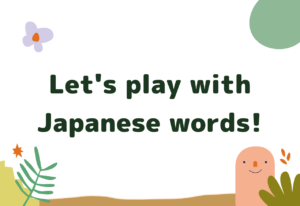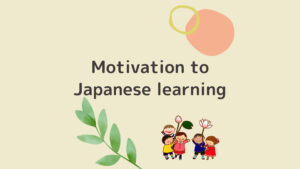
What we do to praise children’s “efforts”
Automatically translated with www.DeepL.com/Translator

Now, in my last article, I talked a little about the importance of praising children’s “effort” based on the data published in the paper. In fact, there are many things that make sense to me in this discussion, even when I look at the children I teach Japanese to.
Today, I would like to share with you what I actually practice and feel from this perspective of praising children’s efforts.
Praise children for "thinking by themselves"!
Learning Japanese outside of Japan often means learning a language that is not really necessary for daily life, and it is very difficult to maintain the motivation to learn it. For this reason, I conduct my daily lessons with the importance of making learning fun and preventing students from disliking learning Japanese.
For example, when I give a quiz on “kanji reading” or “vocabulary,” children who don’t know the answer will whisper to their mothers beside them and ask for the answer, or look at the answer printout in their hands. In my lessons, I consider this to be “okay. This is because I believe that such checking is part of learning.
But more than that, when the children take some time to think about the answer on their own and still don’t understand or make a mistake, I try to praise them for the fact that they thought about it or tried to think about it.
It’s interesting to note that if you do this patiently, the amount of time he spends looking at or listening to the answer will gradually decrease, and he will spend more time twirling his eyes and trying to think or remember.
One of the things that makes me happy as a Japanese language teacher is to see the sense of accomplishment on the children’s faces when they remember or come up with an answer.
Also, when the children are old enough to go from elementary school to junior high school, they discover the rules of grammar on their own and think about the expressions they have just learned, “Can this be used in this kind of situation? They will start to think about the expressions they have just learned and ask a lot of questions.
I would like to emphasize the process of digesting new knowledge while thinking about it, rather than passively participating in the lesson.
How to provide a "think by themselves" environment
So, how do we set up an environment where children can think for themselves? I think the key is to look at the children’s facial expressions and determine if they are in the middle of thinking hard or if they are already tired of thinking. You don’t want to interrupt the child’s hard thinking by giving the right answer too quickly.
Of course, these are parents who are busy with their daily lives and are using their time to help their children learn Japanese. It is not easy for them to wait forever. This is not an easy thing for me to do, even when I think about myself giving lessons.
However, the children have started to think for themselves. First of all, why don’t we try together to wait even one more breath than usual?
And if you think it’s going to be tough, here’s where you can show your skills. Please try to give some hint that will lead to an answer. I believe that this will help children who have almost given up to start thinking again.
A sense of security that "it's okay to make mistakes
Also, I think it is important to create an atmosphere where it is okay to make mistakes. If your child’s first language is Japanese, you may feel “Oh my God! If your first language is Japanese, you may feel a sense of “Oh my God! I think this is a natural feeling.
However, firmly telling children that it is okay to make mistakes because it is important for them to learn will increase their willingness to take on challenges. I feel that this works very effectively in the children’s lessons, but also in the adult lessons, just by saying these words, I feel that it loosens up the atmosphere.
In an environment where it’s okay to make mistakes, we have time to think a little more carefully. Then, in order to figure out the answer, I give them hints and gradually lower the hurdle to finding the right answer. Finally, praise the children for their efforts, whether they did it or not. It may sound simple, but I think there are many things that are difficult to do in practice.
Don't repeat "think by yourself" too often
I would like to encourage them to think hard and praise them for their efforts, but what I also try to do is not to repeat to them, “Do your best and think for yourself.
Thinking needs to be done spontaneously, and I feel that if children are pressured to think too much, they will not be able to enjoy thinking.
If you enjoy the process of “thinking” and finding answers on your own, you will be able to enjoy thinking again. I think there is a slight difference between praising students for thinking hard and constantly asking them to think hard.
Also, if children are asked to think too much, they may start to pretend to think because they are smart. If this happens, it will be difficult for them to regain the habit of thinking for themselves.
I think the important thing is to enjoy “thinking for yourself.
This is what I try to do in my daily lessons, but I wonder what your experience is at home. Of course, it will vary from child to child, age to age, and environment to environment, but I hope you will keep this in mind.




